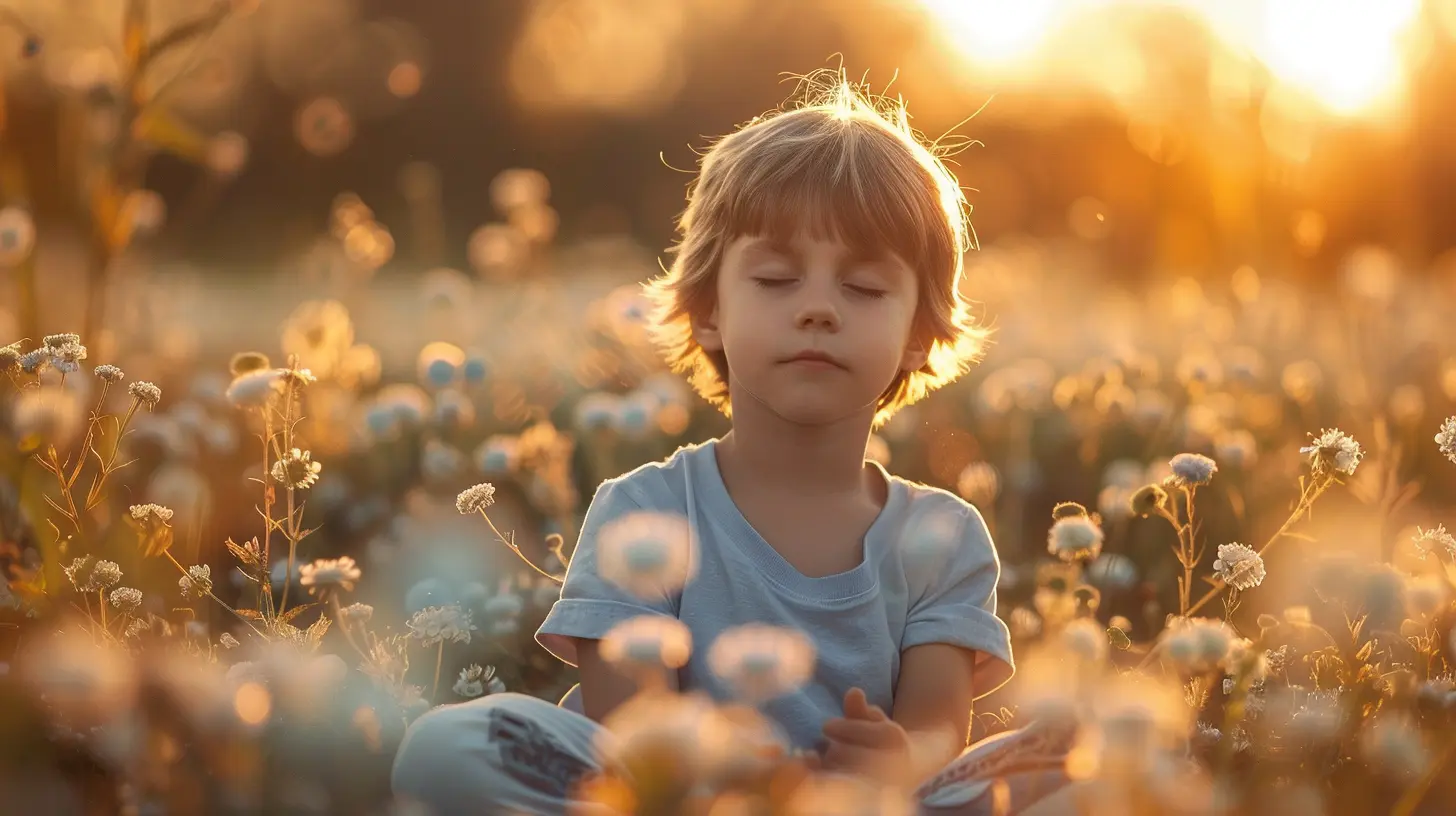Teaching Children Mindfulness for Lifelong Well-Being
18 June 2025
Oh Great, Another Parenting Trend!
Just when you thought you had mastered the art of keeping your kid alive (congrats, by the way), here comes another must-do parenting technique: mindfulness. Yes, apparently, feeding them, clothing them, and making sure they don’t stick forks into electrical outlets isn’t enough. Now, we have to teach them to be Zen masters before they even learn long division.
But before you roll your eyes and dismiss this as another “parenting fad” (looking at you, baby yoga), hear me out. Mindfulness isn’t just a trendy buzzword thrown around by influencers sipping matcha lattes. It’s a legit practice with real benefits that can help your child become a more balanced, emotionally intelligent human being. And hey, wouldn’t it be nice if they threw fewer tantrums over lost LEGOs?

Why Should Kids Even Care About Mindfulness?
Ah, childhood—the time of zero responsibilities and playground politics. What could they possibly be stressed about? Turns out, plenty. Between school pressures, social media toxicity, and the occasional “I can’t find my left shoe” meltdown, kids today are juggling way more than we did back in the good ol’ days of Tamagotchis and Saturday morning cartoons.Mindfulness gives them the tools to handle their emotions, improve focus, and avoid turning into tiny stress balls by age eight. And let’s be honest—if they’re calm, it’s a win for you too.

The Magical Benefits of Mindfulness for Kids
Before you assume this is just another unrealistic Pinterest ideal, let’s check out what mindfulness actually does for kids:1. Goodbye, Meltdowns (Well, Most of Them)
Mindfulness helps kids regulate emotions, which means fewer dramatic “I hate everything” episodes when snack time is delayed by two minutes. They learn to take a deep breath instead of throwing their cereal across the room in frustration.2. Better Focus (AKA Less Homework Battles)
Imagine a world where your child actually sits down to do homework without getting distracted by a speck of dust on the floor. Sounds like a dream, right? Well, mindfulness strengthens attention spans and helps with concentration. So, maybe—just maybe—they’ll finish their worksheet before bedtime.3. Anxiety? Meet Your Match.
We might think kids have it easy, but their little brains are constantly dealing with social pressures, school stress, and, of course, the horror of vegetables on their plate. Mindfulness teaches them to manage anxiety before it spirals into full-blown panic mode.4. Empathy and Kindness (A Parent’s Ultimate Fantasy)
Somewhere between stealing siblings’ toys and monopolizing the last piece of cake, kids are supposed to learn kindness. Mindfulness helps them understand emotions—both their own and others’—so they develop empathy instead of turning into tiny dictators.5. Stronger Sleep Game
Fun fact: Overstimulated, anxious kids don’t sleep well. (Shocking, I know.) Mindfulness helps them relax, making bedtime smoother and reducing the number of times they “need one more glass of water.”
How to Smuggle Mindfulness into Their Routine (Without Them Noticing)
Let’s be honest—your child is not about to sit cross-legged and chant “ohm” for 30 minutes. But don’t worry, mindfulness doesn’t have to look like a monk-in-training scenario. Here’s how to sneak it into daily life like a parenting ninja:1. The 5-4-3-2-1 Trick (No, It’s Not a Magic Spell)
This simple grounding exercise works wonders when emotions run high. Ask your child to:- Name 5 things they can see
- Name 4 things they can touch
- Name 3 things they can hear
- Name 2 things they can smell
- Name 1 thing they can taste
Boom. Instant calm. Well, most of the time.
2. Belly Breathing: Because Breathing Shouldn’t Be That Hard
Teach them to put their hands on their tummy and take deep breaths, watching their belly rise and fall like a sleepy puppy. It’s science—deep breaths tell the brain to chill out.3. The "Mindful Munch" (AKA Teaching Kids to Appreciate Their Snacks)
Turn snack time into a mindfulness lesson by having them describe their food’s texture, smell, and taste. It’s a sneaky way to build mindfulness while also making them less likely to inhale an entire bag of chips in five seconds flat.4. Nature Walks (Yes, Outside Still Exists)
Take them outside and have them notice little details—the colors of leaves, the sound of birds, even the way the air feels. Extra points if you can get through it without them asking for a tablet.5. Gratitude Talks (Because "I Hate Everything" Isn’t a Great Mantra)
Before bed, ask them to list three things they’re grateful for. Even if they start with “I’m thankful for WiFi,” it’s progress.
Common Excuses Parents Use (And Why They’re Wrong)
“My Kid Is Too Hyper for This”
Perfect! Those are the kids who benefit the most. Mindfulness doesn’t mean sitting still like a statue—it just means being present. Even wiggly kids can do breathing or movement-based exercises.“I Don’t Have Time to Teach This Stuff”
Listen, you already spend hours chauffeuring them to soccer practice and reminding them to flush the toilet. What’s five extra minutes of mindfulness?“They Won’t Take It Seriously”
They might giggle or roll their eyes at first, but with consistency, it becomes a habit. And trust me, when they start using mindfulness to self-soothe instead of scream into the void, you’ll be thankful.“I Don’t Even Know How to Practice Mindfulness”
Perfect. You and your kid can learn together. No one is expecting you to be a mindfulness guru overnight. (If they are, kindly ignore them.)Final Thoughts: Is It Worth the Effort?
Short answer? Yes. Long answer? Also yes, but with patience. Kids don’t magically transform into peaceful little Buddhas overnight. But with time, they’ll get better at managing emotions, handling stress, and maybe—just maybe—being a little kinder to their siblings.And let’s be real, if even one of these tricks helps avoid a grocery store meltdown, it’s already worth it.
all images in this post were generated using AI tools
Category:
MindfulnessAuthor:

Madeline Howard
Discussion
rate this article
2 comments
Quentin Morris
Teaching children mindfulness fosters resilience and emotional intelligence, equipping them with essential tools to navigate life's challenges. Instilling these practices early cultivates a foundation for lifelong mental well-being.
October 4, 2025 at 4:59 AM

Madeline Howard
Thank you for highlighting the importance of mindfulness in children's development! It truly lays a vital foundation for their emotional health and resilience.
Fletcher Cantu
Mindfulness nurtures resilience and emotional growth.
June 22, 2025 at 2:32 PM

Madeline Howard
Absolutely! Mindfulness is a powerful tool that empowers children to build resilience and foster emotional growth, setting the foundation for lifelong well-being.


